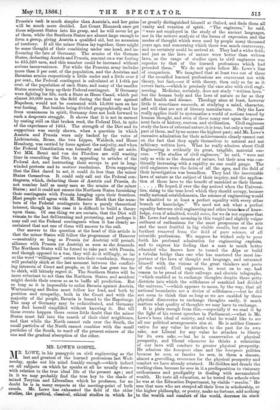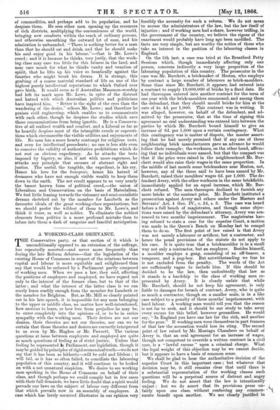MB. LOWE'S GOSPEL.
m-E. LOWE, in his panegyric on civil engineering as the 1YJL last and greatest of the learned professions last Wed- nesday, spoke out his mind frankly enough—which indeed on all subjects on which he speaks at all he usually does— with relation to the true ideal life of the present age ; and in it we may probably find the true key to the shade of mixed Toryism and Liberalism which he professes, for no doubt he is in many respects at the meeting-point of both creeds. Mr. Lowe has exhausted the field of the older studies, the poetical, classical, ethical studies in which he so greatly distinguished himself at Oxford, and finds them all vanity and vexation of spirit. "The engineers," he said, "were not employed in the study of the ancient languages, nor in the minute analysis of the forms of expression and the modes of thought which were used by people many thousand years ago, and concerning which there was much controversy, and no certainty could be arrived at. They had a wider field; and just as the laws of nature were better than written laws, so the range of studies open to civil engineers was superior to that of the learned professions which had preceded them." We do not quite follow Mr. Lowe's line of comparison. We imagined that at least two out of three of the so-called learned professions are conversant not with theory, but fact,—or if with theory, then only so far as it covers facts,—which is precisely the case also with civil engi- neering. Medicine, certainly, does not study "written laws," but the human body and the laws of nature so far as they affect health and disease. Theology aims at least, however little it sometimes succeeds, at studying a mind, character, and will that are not of literary manufacture. Only the Law really applies itself to systematize a world of notions traced by human thought, and even of these many rest upon the perma- nent facts of history, custom, and civilization. Civil engineers study the laws of external nature, it is true, but only a very small part of them, and byno means the highest part; and Mr. Lowe's excessive admiration for their achievements clearly cannot rest on the fact that they apply themselves to natural and not arbitrary written laws. What he really admires about Civil Engineering is evidently its great, tangible, material suc- cess. "The studies of civil engineers," he said, "were not only as wide as the domain of nature, but their area was con- tinually increasing with a rapidity no one could gauge. The civil engineers were the heirs of all the ages, and the field of their investigation was boundless. They had the inscrutable laws of nature as the subject of their inquiry, and the applica- tion of those laws to the benefit of mankind as their theme.
He hoped, if ever the day arrived when the Universi- ties, rising to the true level which they should occupy, became really national establishments, the science of engineering would be admitted to at least a perfect equality with every other branch of knowledge." We need not ask what a perfect equality between civil engineering and other branches of know- ledge, even if admitted, would mean, for we do not suppose that Mr. Lowe had much meaning in this turgid and slightly vulgar outburst of enthusiasm for the most prosperous of the arts and the most fruitful in big visible results, but one of the furthest removed from the field of pure science, of all scientific professions. We suppose he wished only to pour forth his profound admiration for engineering exploits, and to express his feeling that a man is much better educated who knows how to tunnel the Alps or build a tubular bridge than one who has mastered the most im- portant of the laws of thought and language, and saturated himself with the visions of the great thinkers and poets of the world. Civil engineers, he went on to say, had reason to be proud of their railways and electric telegraphs, "which enabled us to exchange thoughts despite those petty districts into which the selfishness of mankind had divided the universe,"—which appears to mean, by the way, that all national boundaries are a device of selfishness ;—but he did not seem to think that so long as we are enabled by these physical discoveries to exchange thoughts easily, it much matters what quality of thoughts we may have to exchange.
Ibis plain enough from this,—especially if we read it by the light of his recent speeches in Parliament,—what is Mr. Lowe's beau ideal of society, and what he would like to see all our political arrangements aim at. He is neither Conser- vative for any value he attaches to the past for its own sake, nor Liberal for any value he attaches to liberty for its own sake, — but he is conservative of physical prosperity, and liberal whenever he thinks a relaxation of our laws will conduce to greater physical prosperity. He admires the bourgeois class and the bourgeois politics because he sees, or fancies he sees, in them a sincere, almost a grovelling, reverence for the physical prosperity and comfort we have already retained. He dislikes and dreads the working class, because he sees in it a predisposition to visionary enthusiasms and prodigality in dealing with accumulated wealth. He tests all education, as he tested the schools when he was at the Education Department, by visible "results." He sees that men who are steeped all their lives in scholarship, or the higher philosophy, or poetry, make no fortune, add nothing to the wealth and comfort .of the world, decrease its stock of commodities, and perhaps add to its population, and he despises them. He sees other men opening up the resources of rich districts, multiplying the conveniences of the world, bringing new comforts within the reach of ordinary persons, and otherwise smoothing the outward lot of man, and his admiration is unbounded. "There is nothing better for a man than that he should eat and drink, and that he should make his soul enjoy good in his labour,"—that is Mr. Lowe's creed ; and it is because he thinks, very justly, that the work- ing class may care too little for this fatness in the land, and may care much for what he thinks vanity and vexation of spirit, that he lifts up his voice so fanatically against the fanatics who might break his dream. It is strange, this grafting of a coarse material standard of life on one of the highest purely intellectual reputations to which Oxford ever gave birth. It would seem as if Australian Mammon-worship had left its mark upon Mr. Lowe, in spite of the distrust and hatred with which Australian politics and politicians have inspired him. "Better is the sight of the eyes than the wandering of the desire," echoes Mr. Lowe ; and therefore he praises civil engineering, which enables us to communicate with each other, though he despises the studies which save those communications from being ignoble. He is a Conserva- tive of all realized wealth and comfort, and a Liberal so far as he heartily despises most of the intangible creeds or supersti- tions which circumscribe the visible utilities and enjoyments of life. No man has a more hearty contempt for religious tests, and even for intellectual precedents ; no one is less able even to conceive the validity of authoritative prohibitions which do not rest on obvious expediency. As he attacks the tests imposed by bigotry, so also, if not with more eagerness, he attacks any principle that savours of abstract right and justice. The useful, the tangible, the expedient, is his cry. Hence his love for the bourgeois, hence his hatred of dreamers who have not enough visible wealth to keep them down to the earth. The net result appears to us very nearly the basest known form of political creed,—the union of Liberalism and Conservatism on the basis of Materialism. We feel little leaning towards the visionary and semi-socialistic dreams sketched out by the member for Lambeth as the favourite ideals of the great working-class organizations, but we should prefer the wildest of them to Mr. Lowe's, and think it truer, as well as nobler. To eliminate the noblest elements from politics is a more profound mistake than to infuse into them a dash of sanguine and fanciful anticipation.































 Previous page
Previous page